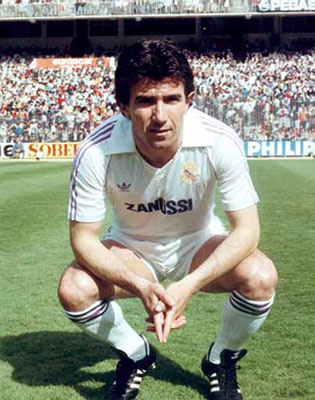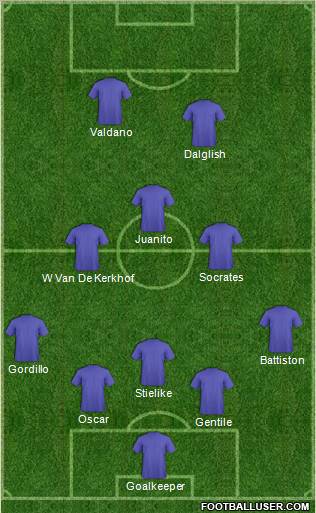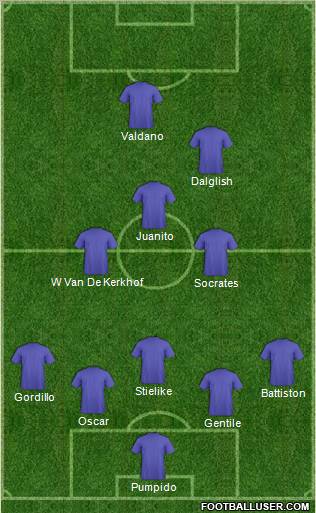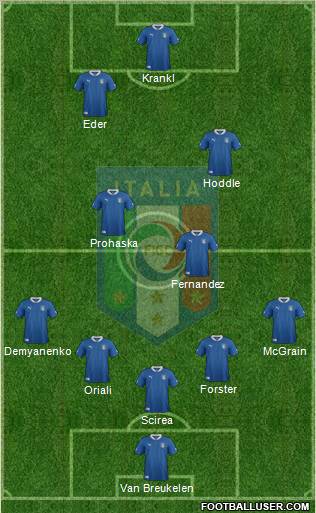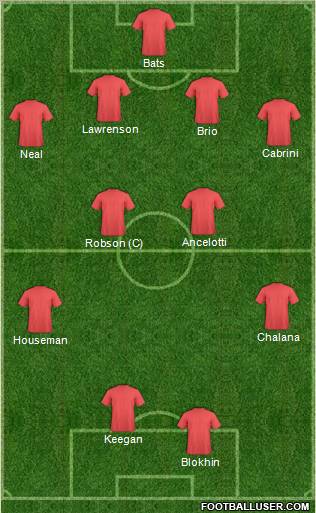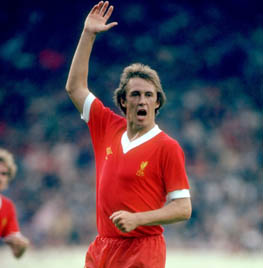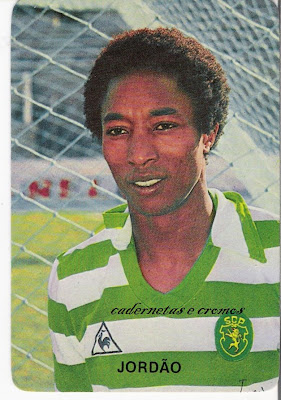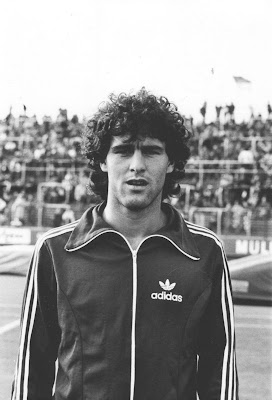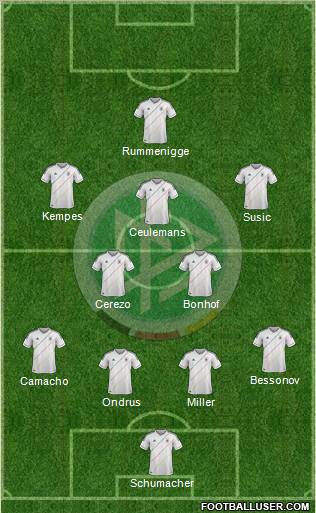Very sorry for the lateness
Player profiles
Harald "Toni" Schumacher
A key player in the West German side that won the European Championship in 1980 and reached consecutive World Cup finals (1982, 1986), Schumacher stands out in an era of great goalkeepers for his mental strength under pressure and ability to step up in major tournaments. Rightfully condemned for his foul on Battison in 1982, Schumacher nevertheless did not let the negative fallout affect his performances, turning in top-of-the-class performances at the UEFA European Championship (1984) and FIFA World Cup (1986). His instrumental role in West Germany’s run to the 1986 final was recognised with the Silver Ball award, behind Golden Ball winner Diego Maradona.
Team honours: 2 times FIFA World Cup runner-up, 1 UEFA European Championship, 2 Bundesliga titles, 3 DFB-Pokal, 1 Turkish league title
Individual honours: World Cup Silver Ball (1986), UEFA European Championship Team of the Tournament (1984), 2 times German Footballer of the Year (1984, 1986)
Vladimir Bessonov
A Soviet all-time great who was equally brilliant in midfield and defence powering up and down the pitch with turbo-charged speed. Technically accomplished and blessed with a potent shot (scoring ratio of 1 in 10 for Dynamo Kyiv), his speed of thought and fleet of foot enabled him to steal a move ahead of his opponents.
Team honours: UEFA European Football Championship runner-up, 1988 Summer Olympics Gold Medal, 1 UEFA Cup Winners Cup, 6 USSR league titles, 5 USSR Cups, 3 USSR Super Cups
Individual honours: FIFA U-20 World Cup Golden Ball (1977), Ukrainian Footballer of the Year (1989)
Jose Antonio Camacho
Real Madrid and Spanish all-time great, Camacho captained club and country in a long and illustrious career where he led by example and inspired teammates with his dedication to the cause. His legendary duels against Johann Cruyff and Dragan Dzajic cemented his status as one of the toughest defenders ever. Mario Kempes said this of Camacho "He was like a hunting dog; wherever you went on the pitch, he went. You knew that if you looked over your shoulder, he’d be there waiting for you. He didn’t talk either, he just breathed in a very strange way – “Fsst, Fsst, Fsst, Fsst”! A real nightmare"
Team honours: 9 Spanish La Liga titles, 5 Spanish Cups, 1 Spanish League Cup, 2 Spanish Supercups, 2 UEFA Cups, European Championship runner-up
Anton Ondrus
A Czechoslovakian legend who captained his team to the UEFA European Championship in 1976 and third place in 1980, Ondrus’s reading of the game and ability on the ball equipped him to initiate attacks from the back. His height and heading prowess also made him a dominant force in the air, as illustrated by his towering opener in the European Championship semi-final against Johann Cruyff’s Netherlands. The fairytale did not end there as Ondrus delivered another stellar display in the final against Beckanbauer’s West Germany, the reigning World and European champions. His leadership and nerveless penalty in the shootout after a two-all draw elevated Czechoslovakia to victory and the title of European Champions.
Team honours: 1 UEFA European Championship, 2 Czechoslovak League titles, Czechoslovak Cup
Individual honours: UEFA European Championship Team of the Tournament (1976)
Willie Miller
Scotland’s greatest ever centre-back, Miller captained his country in an era where Scotland enjoyed abundance of riches in talent, his consistent excellence keeping the higher profile Alan Hansen out of the starting eleven. At club level, Miller dedicated his entire career to Aberdeen, leading them with great distinction as they broke the Old Firm monopoly and achieved success on the continental stage. In Aberdeen’s conquest of the 1983 Cup Winners Cup overcoming the likes of Bayern Munich and Real Madrid, Miller was their best player as he nullified the attacking threats of opponents. His excellence in the fundamentals of defending – his first-rate anticipation, impeccable positioning and the cleanest tackling led Sir Alex Ferguson to describe him as "The best penalty box defender in the world." Karl Heinz Rummenigge called him "The best defender I've ever played against"
Team honours: 1 European Cup Winners' Cup, 1 European Super Cup, 3 Scottish league titles, 4 Scottish Cups, 3 Scottish League Cups
Individual honours: SPFA Players' Player of the Year (1984), SFWA Footballer of the Year (1984)
Rainer Bonhof
An all-round powerhouse who could play in midfield and defence, Bonhof was a fixture in the West German national team throughout the seventies, contributing to their dazzling success in this historic era. Other than possessing boundless stamina and a bone-crunching tackle, Bonhof had possibly the hardest ever shot in football – one that had apprehensive opponents quaking in fear. His driving runs, precise passing technique and set-piece delivery were notable for providing valuable assists - he assisted Gerd Muller's winning goal in the 1974 World Cup final as well as 4 assists in the semi-final and final of the 1976 European Championship.
Team honours: FIFA World Cup (1974), 2 UEFA European Championship (1972, 1980), UEFA European Championship runner-up (1976), European Cup runner-up (1977), 1 UEFA Cup (1975), 1 UEFA Cup Winners Cup (1980), 1 UEFA Super Cup (1980), 4 Bundesliga titles (1971, 1975, 1976, 1977), 1 DFB-Pokal (1973), 1 Copa del Rey (1979)
Individual honours: UEFA European Championship Team of the Tournament (1976)
Toninho Cerezo
One of the finest centre midfielders Brazil has ever produced, Cerezo’s astute footballing brain, prescient awareness, indefatigable dynamism and superb range of passing enables him to act as a mobile pivot in stringing up play and provide an excellent platform for transitions from defence to attack. Tim Vickery has an apt description of Cerezo’s playing style “Few players have ever run a midfield with so much elegance. He received possession behind the line of the ball, giving him a full panorama of the action in front of him. He passed the ball long and short, and after giving it was immediately on the move to initiate the next phase, and he had an eye for the surprise, killer ball that undresses the defence.”
Team honours: 1 Copa Libertadores (1993), 2 times European Cup runner-up (1984, 1992), 1 UEFA Cup Winners Cup (1989), 2 Intercontinental Cups (1992, 1993), Supercopa Libertadores (1993), 2 Recopa Sudamericana (1993, 1994), 9 Brazilian State Championships (1974, 1976, 1978, 1979, 1980, 1981, 1982, 1983, 1992), 1 Serie A title (1991), 4 Coppa Italia (1984, 1986, 1988, 1989)
Individual honours: Brazilian Golden Ball (1977, 1980), Brazilian Silver Ball (1976), Intercontinental Cup Final Man of the Match (1993)
Safet "Pape" Susic
An irrepressible genius who could make killer passes, dribble past defences and score goals, Susic starred for Yugoslavia and attained legendary status at FK Sarajevo and Paris St Germain. His dazzling brilliance frequently paid off with goals and assists such as his stunning hat-tricks against Argentina and Italy in 1979. He scored more than 170 goals in his club career, a staggering return. He was selected as the Golden Player of Bosnia and Herzegovina as their most outstanding player of the past 50 years and voted as Paris St Germain’s best player of all time ahead of George Weah, Rai, Ronaldinho and Luis Fernandez.
Gerd Muller on Susic "If you were to rank Safet Sušić with the all-time greats, you would have to put him in at least the top 40,"
Darko Pancev on Susic "For me he's unsurpassable, the best Yugoslavia had. Probably one of the best in the world. Pape was a treasure for every forward. His crosses were unbelievable."
Team honours: 1 French league title, 1 French Cup
Individual honours: UEFA French Ligue Foreign Player of the Year (1983), Yugoslav Footballer of the Year (1979), Yugoslav league topscorer (1980)
Jan Ceulemans
One of the best footballers in the world during the 80s, Ceulemans was the star player of the excellent Belgium side that reached the European Championship final in 1980 and the FIFA World Cup semi-final in 1986. He further endeared himself to fellow Belgians by turning down AC Milan to stay with Club Brugges in Belgium. Nicknamed Captain Courageous, Ceulemans was like a formidable force of nature, an unrelenting hurricane storming and tearing through the pitch with fearsome pace and power. He had a Rolls Royce engine that motored him to cover every blade of grass and still bomb forward to score goals (over 250 in his career). He had remarkable balance and extraordinary technique that belied his 6 foot 2 frame, enabling him to run with the ball at pace, beat players and score goals in a variety of ways from powering in a bullet header to thunderbolt shots.
Team honours: 4 Belgian League titles, 2 Belgian Cups, 5 Belgian Supercups
Individual honours: FIFA World Cup All-Stars (1986), UEFA European Championship Team of the tournament (1980), 3 times Belgian Footballer of the Year, 3 times Belgian Golden Shoe
Mario Kempes
The cutting edge and decisive factor in Argentina’s triumphant World Cup campaign of 1978, Kempes scored 6 goals en-route to winning the Golden Boot, the Golden Ball and the World Cup in a clean sweep - the first player in World Cup history to do so. Kempes was blessed with explosive pace and matador-like balance, which combined with his strength, work-rate, flair and finesse, make him an utter nightmare to defend against. Fond of dropping into midfield or peeling off wide to start his powerful surging runs, he terrorized defences, carving them up like a hot knife through butter to set up teammates or unleash deadly strikes at goal. In his first season with Valencia, he topped the La Liga scoring charts with 24 league goals, repeating his Pinnichi feat the following season with 28, the highest total since Alfredo Di Stefano in 1956-57. At his prime for Valencia, he averaged more than 2 goals every 3 games. Cesar Luis Menotti on Kempes “He's strong, he's got skill, he creates spaces and he shoots hard. He's a player who can make a difference, and he can play in a centre-forward position."
Team honours: 1 FIFA World Cup, 1 UEFA Cup Winners Cup, 1 UEFA Super Cup, 1 Nacional championship title, 1 Copa del Rey
Individual honours: FIFA World Cup Golden Ball (1978), FIFA World Cup Golden Boot (1978), FIFA World Cup All-Stars (1978), South American Footballer of the Year (1978), Argentina Footballer of the Year (1978), La Liga topscorer (1977, 1978)
Karl Heinz Rummenigge
One of the best forwards in footballing history and a leading contender for the title of the 2nd greatest German footballer ever. A phenomenal footballing Rolls Royce with a frightening blend of pace, power, control and skill, Rummenigge was the quintessential complete forward. His awareness, intelligence and technique augmented the quality of his movement, passing and finishing, enabling him to play anywhere across the frontline with consummate ease, starting and finishing off moves with equal ******.
Team honours: 2 times FIFA World Cup runner-up, 1 UEFA European Championship, 2 Europeans Cups, 2 Bundesliga titles, 1 Intercontinental Cup, 2 German Cups, 1 German Supercup
Individual honours: 2 times Ballon d'Or (1980, 1981), FIFA World Cup Bronze Ball (1982), FIFA World Cup All-Stars (1982), German Footballer of the Year (1980), 3 times Bundesliga topscorer (1980, 1981, 1984), European Cup topscorer (1981)
Sub: Reinaldo
In a career hampered by serious injuries and off-the-field issues, Reinaldo nevertheless shone brightly in the time he was given. His scoring average in the 1977 season (1.55 goals per game) remains a Brazilian league record and his 255 goals for Atlético Mineiro is its all-time club record. His astounding ability to grasp timing and space, his silky technique in manipulating the ball, his audacious composure in finishing all live long in the memories of the fans who revere him as “The King”
Team honours: 8 Campeonato Mineiro titles
Individual honours: Campeonato Mineiro topscorer (1977)
Tactics in brief:
4-2-3-1 formation with Cerezo and Bonhof shielding the defence, Kempes, Ceulemans and Susic supporting Rummenigge. Cerezo has the holding role covering for teammates and stringing up play with his movement and passing. Bonhof has the box-to-box role, where his ball delivery and cannonball shot can add to goal-scoring opportunities. Ceulemans has the brief of breaking forward to supplement the attack in the box. Susic is tasked to create goalscoring opportunities, dribbling at the defence, making killer passes or going for goal. Kempes has the freedom to drop deep or peel off wide to start off on his trademark surging runs.








